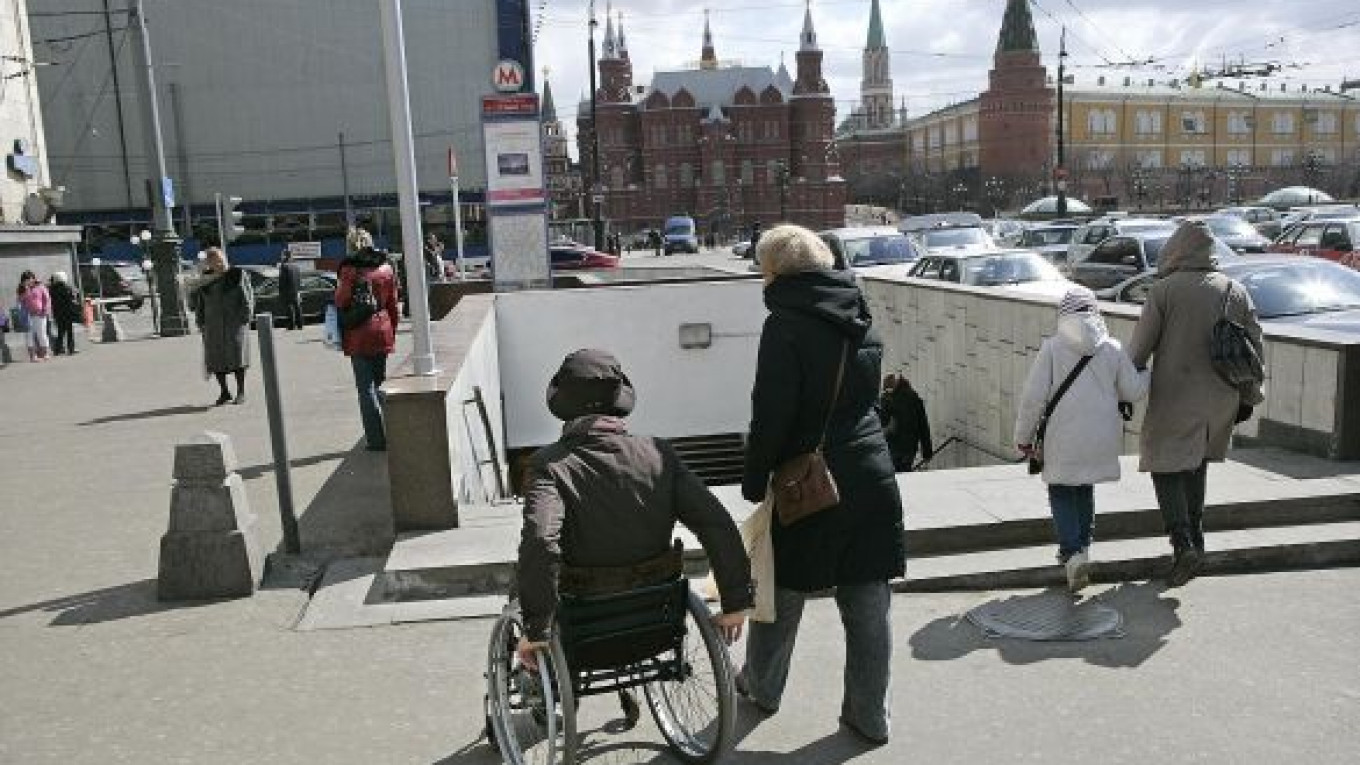With the upcoming Paralympic Games in Sochi set to laud disabled athletes for their accomplishments, ordinary members of Russia's disabled population are still "facing an uphill battle" every day due to a lack of proper infrastructure and general discrimination, Human Rights Watch said in a report released Wednesday.
The 118-page report, titled "Barriers Everywhere," interviewed 123 disabled people about their daily routine in six cities across four regions between November 2012 and March 2013.
While Russia has made some improvements — including service buses with wheelchair ramps, talking traffic lights for the blind and changes at schools to make them more accessible ?€” critical public facilities are still largely off limits for handicapped individuals, the report said.
Public buildings offering healthcare, education, culture and employment services often have restricted access, depriving the disabled of vital needs and thus contributing to their isolation from society. In addition, the report said, the disabled often face more difficult conditions for communicating with friends and relatives, as well as with finding a potential spouse.
One woman interviewed, Alla, said she was forced to depend on others just to make a doctor's appointment.
"You always need to find someone to be friends with who will call and make an appointment for you. Otherwise, you need to go personally to the doctor to get an appointment. If you do not have a mother, then there is no one to help you," Alla said.
Nina, a deaf woman, said in the report that she had to have her son handle all of her doctor's appointments because there was no way to make appointments over the Internet.
Perhaps more alarming, interviewees said emergency services lacked any system for deaf people to contact them, making it impossible for some disabled people to communicate with police, the fire department or paramedics.
"Emergencies are a big problem. You have to rely on your relatives. If something happens, who is going to call the emergency services? You can't text them. I went to them and told them that they needed to have text messaging. That was a year ago. Nothing has happened," said Yekaterina from Ulan-Ude.
Apart from trouble getting health services, a proper education and a job, disabled interviewees also said they faced trouble with more mundane tasks, such as moving around their apartment buildings, getting out of their apartment buildings and traveling around the city and country.
Obstacles for handicapped people in wheelchairs include narrow apartment hallways and the absence of lifts and wheelchair ramps in apartment buildings, public facilities and public transport. ?
According to official statistics, at least 13 million people with disabilities live in Russia, or about 9 percent of the population.
But Russian authorities have not done all that they could to make life easier for their disabled population, the report said, noting that the government generally lacks any sense of responsibility for their failure to secure the rights of the disabled.
In addition, authorities displayed a reluctance to integrate people with mental disabilities into society, said Andrea Mazzarino, Europe and Central Asia disability rights researcher at HRW and co-author of the report. Mazzarino added that "even representatives of the state don't always see disabled people as productive members of society who have rights."
For the most part, the pictures painted by those interviewed for the report don't seem to reflect any results achieved from measures taken by Russian authorities in recent years.
After Russia won its bid to host the games in 2007, the country ratified the UN Convention on the Rights of Persons with Disabilities in May 2012. Soon after, in November 2012, the government approved the "Accessible Environment" program for disabled people for 2011-15, HRW report said.
Authorities have also developed infrastructure for disabled people in Sochi and the surrounding region.
"This is a whole lot of things," said Rachel Denber, deputy director of the HRW Europe and Central Asia Division and co-author of the report.
"But ordinary people living in Sochi don't really feel any of this preparation," Denber said.
Mazzarino said the government would have to do "a lot more to secure the necessary rights of the disabled."
Denber urged journalists to pay more attention to what is being done for the disabled across Russia, especially when the Paralympic Games in Sochi have brought extra scrutiny.
Mazzarino said there was one silver lining, however: The attitude of Russian authorities has come a long way since 1980, when the Soviet Union refused to host the Paralympics because they believed there were no disabled in the country, she said.
Contact the author at n.krainova@imedia.ru
A Message from The Moscow Times:
Dear readers,
We are facing unprecedented challenges. Russia's Prosecutor General's Office has designated The Moscow Times as an "undesirable" organization, criminalizing our work and putting our staff at risk of prosecution. This follows our earlier unjust labeling as a "foreign agent."
These actions are direct attempts to silence independent journalism in Russia. The authorities claim our work "discredits the decisions of the Russian leadership." We see things differently: we strive to provide accurate, unbiased reporting on Russia.
We, the journalists of The Moscow Times, refuse to be silenced. But to continue our work, we need your help.
Your support, no matter how small, makes a world of difference. If you can, please support us monthly starting from just $2. It's quick to set up, and every contribution makes a significant impact.
By supporting The Moscow Times, you're defending open, independent journalism in the face of repression. Thank you for standing with us.
Remind me later.


